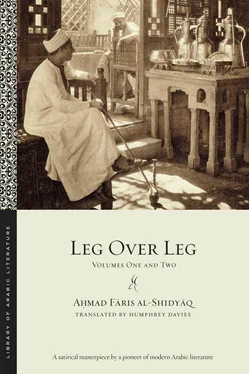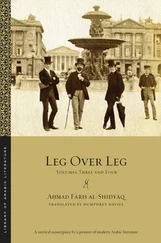2.13.3
“‘If you like,’ said he , ‘climb up here with me , till this crush of camels has dispersed and the hideous climax of these distressing straits has passed its worst , for you are to us as a close friend and to do you honor I intend .’ I found his invitation as compelling as ‘Hie ye to security!’ 525so said, ‘None refuses the offers of the kind but he who’s devoid of righteousness and to the path of prosperity is blind . How can I say no, when my limbs are once more about to be injured and the loads on your camels’ backs leave no place in this land, broad as it is, on which to make tracks ?’ He smiled, indicating a wit quick to answer , a nature ever alert to render a favor .
2.13.4
“Having climbed up to where he was, I found with him a party of men each wearing a turban of a different fashion , 526their faces full of good-natured compassion . After I’d uttered a friendly salutation them to greet and found among them a seat, I was asked by the owner of the store, ‘In a debate that since the middle of the morning has kept us busy, would you care to take your turn (a debate for which we’ve made our ears like the cloth that’s spread to catch the crumbs beneath the quern )? From each to each the turn’s relayed , each one’s opening words amplifying, in sequence, what the last one said , there being no punishment or consequences to be paid , for it’s not a matter here of calling religion into question ; it’s an issue into which any may make investigation .’
2.13.5
“‘You ask of me a terrible thing,’ said I, ‘and go too far by including me among your ranks, if your appeal be to the mind , for I’m no book-worm, but rather one to roaming and travel inclined . If, though, your appeal is to natural intuition , then mine, naturally, is sound, just as upright is my disposition .’ ‘The second,’ said he, ‘is the point round which it all revolves, the factor in our discussion that will lead to a decision .’ ‘Fill, then,’ said I, ‘my ears with your debate and throw upon my back the matched loads of argument between which you hesitate .’ ‘Know,’ said he, God save you all grief , ‘that I, to God be thanks, am a Muslim who to God and His messenger, His inspiration and His revelation, owes belief . My dear friend here (and he pointed to one of the seated) is a Christian, the other a Jew , the next a man with no ideas of his own, who to neither belief nor unbelief will hew . Know too that the debate whose cup we’ve wrested from each other in turn , and in which we’ve taken as many separate ways as pilgrims leaving ʿArafāt, 527has matrimony as its concern .
2.13.6
“‘Now, the Christian claims that to divorce a woman is a very grave sin , an occasion for regret bringing its initiator naught but trouble and chagrin . The proof of its evil, according to his claim and in keeping with his degree of comprehension, is that, once a wife finds she’s no more to her husband than a disposable chattel or worn-out bit of kit , her presence hostage to any chance mistake or trivial slip , she’ll never again honestly share with him her introspection or grant to him her sincere affection . On the contrary, as long as she’s with him she’ll be depressed and full of misapprehension , lonely, sad, bad-tempered, and prone to desperation , practicing deceit and falsification . If she thinks of him as someone by whom she’s been bought , believes his belongings aren’t hers and that soon enough sworn allegations of adultery will be brought , or that he’ll leave her, or strip her of her clothes, dress her in those of a divorcée , and tell her, “Back to your family !” or “Good luck on your own!” or “You are to me as my mother’s back!” 528or “Your nose-rope’s on top of your hump!” 529or “Return to your covert, 530among your kith and kin, for you’re no family to me and I’m no husband to thee !” she’ll never be solicitous of his secrets or what he may need and to whatever evils may befall him she’ll pay no heed .
2.13.7
“‘She may betray him with regard to his honor or his monies and lay traps to make him an object of scandal before his peers and cronies . And there’s another danger too, more calamitous still and leading to greater sorrow , more injurious and harmful, yet more painful and harder to swallow , which is that, if a wife hates her husband because of what she’s suffered at his hands and fears what havoc he may wreak , she’ll not bother to care for his children or the welfare of his household seek , for if a woman doesn’t love her husband, she’ll not love his offspring and his seed ; she’ll love her husband only if he maintains their union and fulfills her need . Any man who has a wife to whom he does not give his heart and devote his entire affection will be taken by her as a deadly foe, not a friendly companion , in which case he’s to be pitied even by those who observe his misfortunes with glee and those who inveigh against him should leave him be , for when things reach this point his breast becomes a wellspring of sorrow, his head a place for horns to grow, his home a camping-ground for ire , and, in short, his condition that of Those Who Dwell in Fire .
2.13.8
“‘I, on the other hand, object to those who’d forbid divorce and the obligations of their wives enforce , on the grounds that, if a wife knows her husband’s body with hers is one , that his secrets are on her tongue , making them like a single person, not a pair , whether they plumb the depths or rise to great heights in the air , that naught but the file of death this solder can fray , naught untie the knots of this condition but the dissolution of their earthly clay —so that, should she sicken, he too falls ill and, if she takes a stand, he must (un)buckle to her will , her every demand fulfil 531—then she’ll rebel and disobey , play tyrant and insist she have her way . One time she’ll force him to buy jewelry and clothes , another insist on his swallowing some other bitter dose ; then woe unto him if he concurs , and double woe if he demurs ! If he spends one night away from home, all her guile on him she’ll vent , and if some profitable business of his distracts him from her, she’ll do anything she can to his detriment . Thus he makes it his habit to placate and flatter her , to play up to and humor her , to pay her compliments when she gives him the cold shoulder and be nice to her if she leads him a dance , to play the woman with her when she plays the man, and cower when she looks at him askance . Can life be sweet when one knows he’s a pawn to the whims of another and at his hands condemned to suffer ?
2.13.9
“‘As for the children (the reason for putting up with this pain in the liver), if a couple are in a state of aversion and contumely , conflict and contumacy , the way they bring them up will be simply an invitation to imitation , a training, through their agency, in abomination , and how much better it would be to divorce the mother and leave them sans upbringing, concord being a factor more important than any other . In addition we know — from experience gained since the day the Almighty decreed that marriage be the law and saw that it was good —if a woman knows her husband can divorce her and slip from her clutches, she’ll treat him lovingly and as she should , indulge him and be a good friend , go along with his whims and help him unbend , put right anything that’s wrong and agree with his views , compliment him and use language that soothes , fearing lest her life become unbearable should he leave her or she be deprived of what he owes her of this world’s joy , for if there’s no concord between them, “Divorce! Divorce!” will be his cry . This Jewish friend of ours doesn’t differ in his opinion much , for he disagrees with me only over the conditions for divorce (which, for him, are such and such ).
Читать дальше












